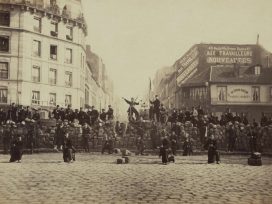Major events are not necessarily beautiful, nor joyous. They take you by surprise. They do not necessarily produce integration. The reason why they happen never says anything about the moment of their occurrence. Like the proverbial straw that breaks the camel’s back, there is a long build-up, until, one day, submissiveness becomes impossible, and you tear down the house.
A riot is rarely a cause for enthusiasm. Its actors are usually unknown, confused, and seldom heroes. There is more than a whiff of undirected, aimless violence in a riot. Unlike wars or revolutions, the dead it leaves behind, or who lie dazed in its wake, will never be decorated. “Melancholia”, “despair”, “nihilism”, “loss of confidence”, were the conventional vignettes promptly used by the not-too-stupid Right to label the rioters. They refused to touch the issue with a bargepole, as one would expect. But it was the embarrassment of the Left that was truly flabbergasting. The Left would have been well advised to remember the Versaillais “moral restoration” or, more recently, the emergency decrees of the Algerian War recycled by the French government, confirming that the recent revision of history textbooks by act of parliament, on the grounds that colonization had “positive effects”, was in no sense a freak occurrence.
A few isolated voices rose up against this propaganda overkill. They salvage the honour of what is left of the French intelligentsia after twenty years of nauseating reactionaryism. Recall the outcry against the “madmen” of Nanterre in 1968, and against the “hooligans” of Saint-Lazare ten years later: in both instances, these outbursts were the premonitory signs of an enormous upheaval (May ’68, the shift of power to Mitterand in the 1980s). So perhaps the cautious should have been a bit more cautious! As Francoise Blum boldly wrote in an op-ed in Le Monde, it is quite possible that the “apolitical” youths of the banlieue have done more to set things in motion than thirty years of cheap media posturing and vainglorious political statements. They might well have started to get rid of the insufferable Monsieur Sarkozy, something our “politically mature” Left has shown itself utterly unable to bring about, preoccupied as it is with its botched presidential aspirations.
Society must be defended against order. Hence, we must defend the rioters against stupidity. Their own, for which they have been blamed ad nauseam, is surely not the biggest around at this juncture. During the rioting, our government, and a few of our prospective holders of power, displayed an arrogance, a social blindness, a crass stubbornness, and a persistence in error that was truly breathtaking: especially when viewed in a country that knows quite a bit about urban riots – just think of Watts and Los Angeles.
Together, we constitute a human society, and not a mere anthill, if, and only if, we are able to get angry (which is always a folly) and to riot. Yes, to riot. Just look in any history book. We constitute a human society in so far as we are able, first, to generate rioters through a long and dogged process of self-deception, and thus to recognize them as our own children (and not some scapegoat figures of the “excluded”, the “others”, the “aliens”, to be air-lifted elsewhere). And then, in so far as we are able to respect the grief of any being which shares that same little patch of planet as ourselves, and are able to get angry at the viciously absurd sequence of mechanisms that institute the closest thing to the death penalty in Europe whilst appearing to banish it as a legal instrument of state power. In so far as we are able, also, to control our panic and fear in the wake of the chilling future that is already our present and whose cruel image is waved in front of us by the rioters as if in a mirror. And finally, in so far as we are able to react with intelligence to this new, harsh reality, to ponder what is being said, to consider what is truly at stake, and most of all, to realize that immense thing that is left unsaid and unseen, and yet is there, like the Purloined Letter.
Breaking through the audibility barrier is difficult in our information societies. The selection of what is relevant news comes at a high price – just look how much the people in power spend on PR. The humbled and the stricken do not command such resources. In order for modern media society to start listening to the suppressed message send out by the rioters, it was apparently necessary that a few rubbish bins went up in flames, followed by charred busses and trams, cars set ablaze by the thousands (that is to say many more, and in many more places than that which had become the daily routine), in addition to the vandalizing of a few schools and the trashing of a shopping centre. But three people also had to die, which is unfathomable, and, hardly less calamitous, hundreds of youths had to be arrested, and a few dozen deported (to return to Ceuta and Melilla and scale the barbed wires of Fortress Europe in order to come home, which is to say, to France). And to crown it all, there was the extremely disturbing, precedent-shaping recourse to the emergency legislation and curfew orders dating from the Algerian War in 1955. (It should be noted that a state of emergency was not proclaimed even during the events of May 1968 – when there were 9 million workers on strike, scores of occupied factories, and students at the barricades all over Paris.)
All this so that a message be heard. A simple message. Refusal to talk is a message in itself – any teacher will tell you so. One has to deserve to be spoken to. To be spoken to presupposes trust, love, and respect, not defiance. The French interior minister’s fighting talk, began by the either moronic or fascistic pronouncement that he would “clean up the banlieue with a Karcher” [an industrial high pressure cleaner – trans.] got him the response he deserved. The ministerial delegate for integration, Azouz Begag, actually said so quite a few times during the crisis. And the events could have turned much worse. Taking the daily occurrence of police malpractice into account, and of racism, of discrimination in the matters of employment and housing, never mind the countless other forms of cultural discrimination, which are just as dreadful, France can count her blessings. Were the rioters not listening? Was their muteness a token of imbecility? This does not appear very believable when one sees that every provocation by the government (namely Sarkozy on 30 October 2005, talking about “scum” and promising “zero tolerance”, and the measures announced by Prime Minister de Villepin on 1 November 2005) was promptly followed by a broadening of the movement.
Now it is true that the redundant and empty noise of the official discourse about order, the restoration of authority, and the universalism of the law, was mainly intended to saturate the rather limited receptive and analytical capabilities of the press. It partly succeeded in achieving this, but for the few unnervingly eloquent feats of street-level reporting.
Thanks to this long riot, one can no longer deny that France has remained blind to the gendered and racialized dimension of the “social question” that has become crucial within the unfolding of globalization. France is perversely colour blind. Television dishes up a daily fare of integration problems in the banlieue by showing young blacks, who are often French nationals, or come from our former colonies (the Ivory Coast, for example, where French troops are stationed). At the same time, news analysts (for example, A. Adler in Le Figaro, 10 November 2005) maintain that it is all about North Africans, about Islam and Islamism. Meanwhile, the state unflinchingly denies the existence of minorities on French territory, decrying any allowance for an ethnic minority attachment as a mistaken, “Anglo-Saxon” (but in fact Protestant) concept. But it is something that one cannot reject if one wants to start afresh from what really exists, and not from some elusive “People” decreed into existence by the government.
The “French Republic of the Great Nation” has, not without difficulty, achieved external de-colonization (well, sort of), but has made hardly any progress in ridding itself of universalism’s internal colonization. A dab of post-colonial studies added to the curricula of state schools and of prestigious training institutes for high-ranking civil servants might go some way towards making its police force democratically accountable. Indeed, what is shocking is not the behaviour of the frightened and inexperienced policeman on the beat: the banlieue youths know very well the difference between fair cops and the truly racist ones (Sartre would have called the latter “les salauds” – the bastards). What matters are the “little phrases” from those at the top, functioning as so many assurances of impunity, and automatically resulting in an increase in police brutalities.
The Republic is also naked because French republican assimilationist ideology has never been able to understand much about the transcommunitarian integration of the multitude in the era of globalization. This has been argued repeatedly by a fairly small number of social scientists – I am proud to count myself among them – who were mostly talking in a vacuum. The ideology of republican assimilation remains mired in the concept of “the people”, a pre-fabricated “national identity”, and in colonial servility. Yet a little more funding (far less than is needed) towards the umpteenth “banlieue regeneration” scheme will not change one iota of the “cascade of contempt” cruelly referred to by Voltaire when speaking of pre-Revolution French society. This is precisely what French rioters rose against.
Loic Wacquant, together with the majority of academic researchers, has been telling us for the past twenty years that the French banlieue are not the same as the black ghettoes in the USA, that what looked like ghettoes in France were no such thing, and that the Republic had saved us from having American-style minorities in our midst. Dominique Schnapper, in a book on the Nation, which I criticized in its time, also expounded the theory that the French universalist model was the polar opposite of a German concept of “Volk” based on a community of language and the bond of blood.
But the true antinomy lies between a racist European labour migration model that denies foreign populations the right to settle and that of countries relying on immigration and settlers. The European system is much more closed: it is that of a “Fortress Europe”. It is a model that is inherently wrong in so far as it has, in the past fifty years, created real minorities. These minorities do not resemble those made up of the children of recent immigrants to the United States, but those of the descendents of victims of the slave trade. The youths in the European migrant neighbourhoods are becoming our own US-style blacks. Watts and Los Angeles are our future. And the Republic, which was supposed to protect us against such an outcome, is going to lead us there rather faster than the British model. This is our current predicament, and nothing more.
Society must be defended, and the order of the Republic is not taking us anywhere near this goal. The issue at stake is the unfinished condition of democracy, and that pertains to the whole world: there is no such thing as the “French exception”. In Andersen’s famous tale, “The Emperor’s new clothes”, an apprehensive monarch struts around naked, surrounded by an obsequious royal court; all that is needed to make visible the obvious is the clear voice of a child. She cuts right through the chaos that is order and calls its bluff: “But he’s wearing no clothes at all! The emperor shivered as it occurred to him that the people were right, but he thought to himself: ‘Now I must stick it out till the end’. And so the procession went on and the chamberlains continued carrying a train that was not there.”
In France in 2005, the “state carriage”, complete with flamboyant gargoyle, monarch, the holder of the true knowledge, and grand vizier, who remains in the dark yet is very talkative on television, seldom passes through the banlieue that it has created. It prefers to step out on the Champs Élysées, or embark on well-organized campaign trips, either into a reassuringly rural France or to spruced-up, gentrified town centres. And when it does run the gauntlet, fawning in the media limelight, to “take the pulse of the banlieue“, you can be sure that the “scum” has been duly removed beforehand lest it blight the picture.
But now the “scum” has invited itself to the parade. And nobody can pretend to have heard nothing, save of course a state that is walled up in the sort of blindness that has always begotten revolutions. It was not the voice of innocence, but the far less reassuring voice of the truth about our national and “republican” society. With total abandon, and a recklessness reminiscent of Gavroche, the “scum” furiously shouted that “the Republic is naked!” and “racism is everywhere!”
“Why do we command so little respect as to be described as being ‘juiced’?” they ask – to quote the shameful word used by the minister of the interior. We are not living in Andersen’s country, but in one that is seldom reformist, that is prone to revolution every now and then, but that most of the time is deeply reactionary. So it was a safe bet that the “scum” were going to pay dearly. 1200 people rounded up, over 120 were arrested, and countless convictions await. The magistrates, who must uphold the law once the police have made its maintenance totally unmanageable, have been annoyed no end. All this with the active support of a hyped-up presidential hopeful who thinks he is going to carry the day in 2007 by appealing to frightened pensioners, sovereignist Gerard de Villiers supporters, racist Front National enthusiasts, and a scattering of Laurent Fabius and Jean-Pierre Chevenement devotees. A supposedly insignificant, yet elusive multitude, that is both mute and insufferable, is therefore being made to pay. Offending immigrants are being expelled, even if they hold valid residence permits, announced the same minister of the interior, in his characteristic offhand manner, betraying his lack of culture and contempt for the law. Yet it is the same minister who voiced his opposition to the double penalty – only to restore it under emergency legislation.
When a power-frenzied “Bonapartist” Right appears behind Sarkozy the “Orleanist”, accompanied by equally Bonapartist “Neo-Gaullists”, the flavor du jour is the nineteenth-century “paternalism of the bosses”. Once order has been restored, the talk is all of “travail” (work), followed by “famille” (family), with “patrie” (fatherland) thrown in for good measure.
And so the prime minister has launched the ultimate weapon against the circumstances that hatched the “scum”. Yes, we are going to occupy these youths, we are going to get them apprenticeships at the age of fourteen – a regression in thinking about education that beggars belief, and that lags deplorably behind the Lisbon programme. They will all be sent within the next six months to the national employment agency in order, one presumes, to be offered these fabulous labour contracts worth half or even a quarter of the legal minimum wage (something between EUR 300 and 500). “The Law shall have the last word”, as the servants of the Republic, robed in the awesome albeit bogus drapery of “French-style integration”, never tire of repeating, as if to convince themselves of a sales pitch they no longer believe. By screaming that the Republic is naked, the rioters took up the defence of society. And we state, calmly but firmly, so as to let them know that they are not alone: “Society must be defended”.






